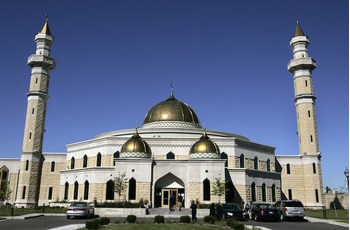
RNA - Last month, a Muslim community in and around Kennesaw, Georgia asked the city council for the right to rent a 2200-square foot space in a local strip mall to conduct daily prayers and Friday services. The group argued that many of their worshippers currently have to drive long distances to meet with other Muslims for religious gatherings, and wanted to use the storefront as a temporary location until they found a more permanent home, Think Progress reported.
But after two weeks of heated debate, the council silently denied the community’s request on Monday night, striking down the measure in a 4-1 vote without further comment. Only one council member, Cris Eaton-Welsh, voted in favor of the motion.
“This is 100 percent, bar none, a First Amendment issue,” Eaton-Welsh said, referring to the Constitutional Amendment guaranteeing all Americans the right to freely express their religion. “They have the right to assemble. I don’t understand their religion, but they have the right to do this.”
The rest of the council, however, did not agree. It wasn’t immediately clear why the majority of the council voted against the motion, but their actions were celebrated by opponents of the mosque, including many who protested outside the city council building before the vote. The demonstrators held signs with emblazoned with anti-Islam slogans such as “Ban Islam” and “Islam wants no peace!”, and appeared to oppose both the mosque and Islam in general.
“To me [the mosque] is a threat to my freedom, my liberties, and everything I own,” one demonstrator told local news station 11 Alive.
Kennesaw Mayor Mark Mathews listed more practical arguments for rejecting the temporary mosque, explaining to the Marietta Daily Journal that frequent Muslim prayer times could increase traffic in the area and interfere with the business of nearby shops. Mathews also reportedly told local news affiliate WSBTV that this was the first time the city had been asked to provide worship space in a retail center.
But as the Marietta Daily Journal reported on Monday, city records show that the council has allowed religious groups to use retail spaces in the past. Council members voted as recently as July to allow a Christian congregation — Redeemed Christian Fellowship Church — to inhabit a 4,000 square-foot retail space in the city, a unanimous vote that renewed a June 2013 decision to grant the Pentecostal community use of storefront property.
Nevertheless, the Muslim community offered several concessions to help address traffic and parking concerns. In addition to agreeing to a two-year lease, the group was working on a settlement with the city that would have limited capacity at the center to 80 congregants and prohibited them from using more than 40 parking spaces at one time — as long as they dropped the threat of the lawsuit.
“The muslim community has been nothing but respectful and patient,” Eaton-Welsh, a Catholic, said. “I don’t know if I would have been as patient as they were if people had said some of the things they said about them about me — in front of my children.”
Indeed, despite appeals to civility, anti-Muslim rhetoric has been a hallmark of the debate over the mosque. In addition to heated exchanges between local Muslims and opponents of the mosque — including one instance where a woman stood up at a public meeting and declared to the Islamic group “we’re scared of you” — Eaton-Welsh said that, because she was expected to vote in favor of the mosque, she was forced to accept police protection in the days before the vote. She said authorities offered to guard her home after an anti-Islam group posted her personal information online — including her home address and photographs of her children.
“My kids and your kids probably grew up together, played together, went to school together,” Amjad Taufique, a representative for the Islamic center, said at a meeting a week before the vote. “Please do understand that law-abiding is a concern for me just as it is to you.”
Despite Monday’s decision, however, the debate over the mosque is likely far from over. Doug Dillard, the attorney representing the Muslim community, told 11 Alive that the group could file a federal lawsuit against the city.
“The First Amendment was the First Amendment for a reason,” Dillard said after the vote. “Irrespective of whether you believe the religious beliefs of particular folks, this country was founded in the right to worship as we please in peaceful assembly. And that’s all these people want. And they’ve been denied that right tonight. And my advice to them is not to take it laying down.”
R111/108/C/